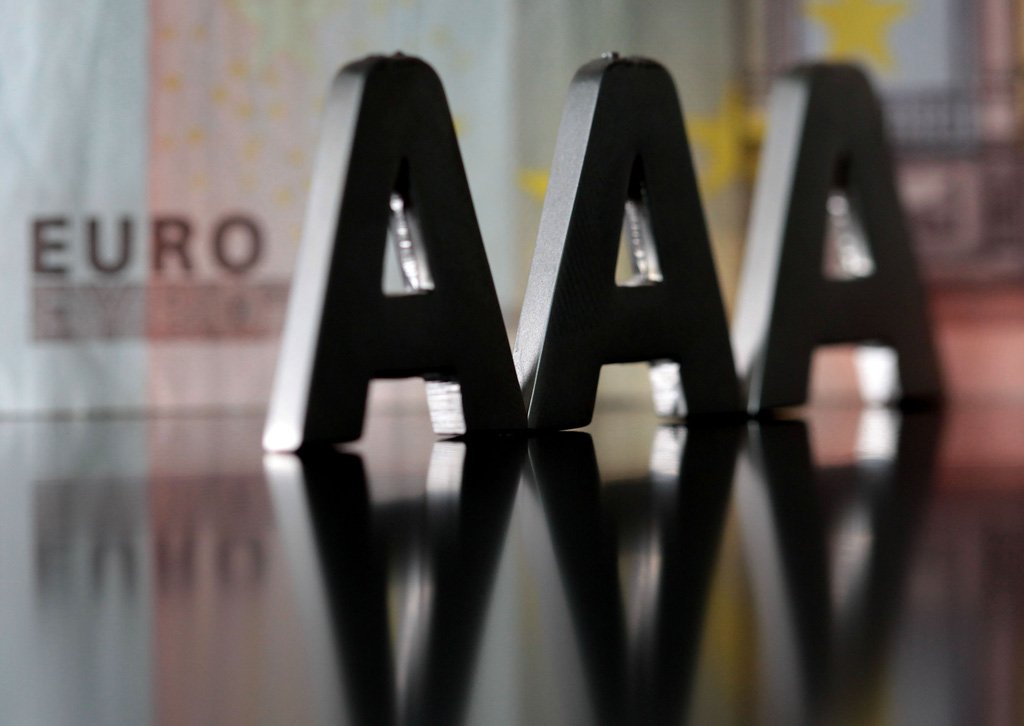
Moody’s has warned the outlook for Germany’s AAA credit rating is negative, the first step towards a possible downgrade.
Credit ratings agency Moody’s said the country was at risk from the increased likelihood of a Greek exit from the euro and the need to provide more support to Spain.
Concerns are growing that Spain will have to seek a full bailout.
The Netherlands and Luxembourg – both AAA rated economies – were also put on negative watch.
A negative outlook posting from Moody’s, one of a handful of agencies that assess the creditworthiness of borrowers, reflects a higher risk that the actual rating will be cut at some point in the next two years.
France and Austria lost their AAA ratings earlier this year.
Moody’s said there was an increased chance that Greece could leave the eurozone, which “would set off a chain of financial sector shocks”.
It added that policymakers could only contain these shocks at a very high cost.
Representatives from the troika of international lenders are due to arrive in Greece later to assess its progress towards reducing its debts.
They must decide whether Greece is eligible to receive 31.5 billion Euros – the last tranche of a 130 billion euro ($158 billion) aid package agreed in March.
Greece is behind in its plans to cut spending and debt because its economy is shrinking faster than forecast.

Separately, the German finance minister, Wolfgang Schaeuble, is to meet the Spanish Economy Minister, Luis de Guindos, in Berlin.
The meeting comes a day after Spain’s borrowing costs rose to their highest level since the creation of the euro. Yields on the country’s 10-year bonds remained above 7.5% on Tuesday.
Italy’s 10-year bond yield was also stuck at a high level, with a yield of 6.377%.
Moody’s warned that Germany and other highly-rated countries may have to increase levels of support for countries such as Spain and Italy, who have not asked for a Greek-style bailout but who are struggling with high debt levels.
It said in a statement: “Even if such an event [a Greek exit] is avoided, there is an increasing likelihood that greater collective support for other euro area sovereigns, most notably Spain and Italy, will be required.
“This burden will likely fall most heavily on more highly rated member states if the euro area is to be preserved in its current form.”
Jim O Neill, the chairman of Goldman Sachs asset management, said the European Central Bank needed to take radical action.
“If Italy gets into already the kind of pressure that we now see on Spain, there would be contagion into the French markets probably… so the policy makers have got to do something a little bit more decisive in terms of monetary interventions,” he said.
Lena Komileva, the chief economist at the investment research company, Gplus Economics, said she too was worried about problems escalating.
“My concern is that an outright sovereign bailout is such a politically unpopular measure that it might just happen too late, which means that Spain will continue to bleed contagion into the rest of the eurozone for the remaining of the year.
“Italy of course is an open target for contagion, but I’m increasingly concerned about the position of France.”
The downgrades come as worries over the eurozone crisis pushed the yields on Spanish and Italian debt to record euro-era highs, reflecting a weakening of faith in the pair’s financial position.
The German Finance Ministry said the country would remain strong, and said that Moody’s was focusing on short-term risks.
“By means of its solid economic and financial policy, Germany will retain its <<safe haven>> status and continue to play its role as the anchor in the euro zone responsibly,” the ministry said.
Rival agencies, including Standard & Poor’s and Fitch, have Germany on the AAA top rating with a stable outlook, implying they do not currently foresee a weakening of its financial position, although all agencies regularly review their rankings.